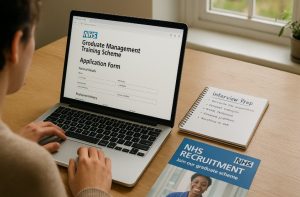The NHS Graduate Management Training Scheme is one of the UK’s most prestigious public sector graduate programmes.
Designed to develop future leaders, it offers structured training across multiple healthcare management specialisms.
With real-world experience, academic qualifications, and professional support, participants gain the skills needed to drive change across the NHS.
This blog explores the benefits, salary expectations, and career prospects associated with the scheme, helping aspiring graduates understand what makes this opportunity so impactful and competitive.
What Is the NHS Graduate Management Training Scheme?

The NHS Graduate Management Training Scheme (GMTS) is a career-defining opportunity for those aspiring to take on leadership roles within the National Health Service.
Administered by the NHS Leadership Academy, the scheme has been designed to identify and nurture future leaders who are equipped to respond to the complex challenges facing healthcare today.
It is structured as a two-year programme, though some specialisms extend to 31 months. During this time, graduates take part in multiple placements within NHS trusts, integrated care systems, and commissioning bodies.
Each placement offers exposure to a different facet of healthcare delivery, ranging from frontline service provision to high-level strategic planning.
The scheme is not simply a job placement—it is a developmental pathway. Participants complete postgraduate study alongside practical experience, gaining qualifications that vary by specialism.
They receive mentorship, attend leadership conferences, and work on real-time projects that affect the patient journey and operational efficiency.
The GMTS is highly respected, both within and outside the NHS. It is consistently ranked among the top graduate schemes in the UK due to its comprehensive training model, structured support, and the genuine impact trainees make during their tenure.
How Does the NHS Graduate Scheme Shape Future Healthcare Leaders?
From the outset, trainees are placed in dynamic environments where they are encouraged to lead, influence, and innovate. Unlike other graduate schemes where early roles may be observational or administrative, GMTS offers graduates the opportunity to own projects and influence decision-making.
Trainees can find themselves contributing to patient flow improvements in a busy accident and emergency department or developing operational strategies in a regional commissioning group.
Some work directly with patients and staff on service transformation projects, while others manage data-driven initiatives that support policy decisions.
The following are typical responsibilities trainees may take on during placements:
- Leading improvement projects in clinical or administrative settings
- Conducting audits and presenting findings to senior stakeholders
- Supporting budget and workforce planning initiatives
- Collaborating with clinical staff to redesign services
- Analysing patient feedback and service performance data
The training model also encourages reflective learning and personal development. Each trainee works with a mentor, placement manager, and a dedicated leadership development consultant who supports their progress through regular feedback and coaching sessions.
Trainees emerge with a solid understanding of the NHS’s structure and culture, ready to enter middle management roles with the confidence and insight needed to drive meaningful change.
What Are the Specialisms Offered Under the NHS Graduate Management Training Scheme?

The NHS Graduate Management Training Scheme offers four core specialisms designed to nurture leadership skills across different areas of the healthcare system.
Each stream includes academic qualifications, hands-on experience in NHS settings, and structured support to guide the trainee’s personal and professional development. The goal is to develop well-rounded leaders capable of driving improvement, innovation, and sustainable change within the NHS.
General Management
The General Management specialism develops future leaders who are capable of overseeing services, leading operational teams, and driving performance across various NHS departments. Trainees participate in service improvement projects, strategic planning, and day-to-day management responsibilities.
Trainees study for a Postgraduate Diploma in Healthcare Leadership, awarded by the University of Birmingham. The academic element is integrated with practical training and features experiential and action learning. Participants engage with real-world scenarios in both large group settings and smaller Inquiry and Application Groups.
They also take part in Action Learning Sets and attend leadership conferences where they collaborate with peers and learn from sector experts.
Although teaching takes place during work hours, trainees are expected to complete assignments and revision in their personal time.
Career progression is strong in this stream, with alumni moving into roles such as:
- Outpatient Deputy General Manager
- Clinical Services Support Manager
- Strategy & Partnership Manager
- Delivery & Service Improvement Manager
Key Details:
- Duration: 2 years
- Entry Requirements: 2:2 or above in any degree
- Location: England
- Salary: £30,277 + benefits
Trainees in this specialism benefit from a dedicated support network that includes a Trainee Support Manager, Education Officer, Placement Manager, Programme Manager, and a buddy from a previous cohort.
Finance
The Finance specialism is designed for those interested in financial leadership and management within the public healthcare system. Trainees focus on cost control, budgeting, financial modelling, and policy analysis, ensuring that services are delivered in an economically sustainable way.
This stream supports trainees in gaining the Chartered Institute of Public Finance and Accountancy (CIPFA) qualification. The programme covers 12 core modules including Financial Accounting, Management Accounting, Audit and Assurance, and Company Financial Reporting. At the end of the scheme, participants submit a strategic case study demonstrating their learning.
Alongside their finance training, trainees complete the Rosalind Franklin Leadership Development Programme, which helps shape their leadership capabilities. The leadership training is delivered through virtual workshops, conference-style events, and group learning.
Upon completing the scheme, trainees have entered roles such as:
- Finance Manager
- Business Analyst
- Management Accountant
- Pricing Analyst
- Director of Finance (in later years)
Key Details:
- Duration: 2 years and 6 months
- Entry Requirements: 2:2 degree or above in any subject
- Location: England
- Salary: £30,277 + benefits
As with other specialisms, trainees are supported throughout the programme with access to structured mentorship, academic and pastoral care, and peer support.
Human Resources
The Human Resources specialism is focused on developing professionals who can manage and improve the NHS workforce. This includes recruitment, training, engagement, and organisational development strategies that contribute to patient care through better staff support.
Trainees complete a Postgraduate Diploma in Human Resource Management from the University of Leicester. Modules cover areas such as Employee Development, Managing Change, Organisational Performance, and Human Resources in a Business Context.
The programme also incorporates the Rosalind Franklin Leadership Development Programme, delivered through a blended format. Trainees participate in Action Learning Sets and attend sector conferences to gain exposure to a wider range of challenges and best practices.
On successful completion, trainees gain CIPD accreditation, positioning them for senior HR roles. Past alumni have secured roles such as:
- Resourcing Manager
- HR Manager
- Assistant HR Business Partner
Key Details:
- Duration: 2 years
- Entry Requirements: 2:2 degree or above in any discipline
- Location: England
- Salary: £30,277 + benefits
Trainees benefit from consistent mentorship and guidance, with additional opportunities to learn from NHS alumni, educators, and industry experts throughout their placements.
Health Informatics
The Health Informatics specialism equips trainees to lead the NHS’s digital transformation through the strategic use of data and technology. Participants focus on digital systems, information analytics, and innovation that supports clinical and operational decision-making.
Trainees pursue a Postgraduate Diploma in Data Analytics, delivered in partnership with University College London and the University of Manchester. Modules have included:
- Essentials of Informatics for Healthcare Systems
- Principles of Health Data Analytics
- Health Information Systems and Technologies
In addition to their academic work, trainees complete the Rosalind Franklin Leadership Development Programme, participate in Action Learning Sets, and attend national conferences. Coursework is completed outside of working hours, but all classroom instruction takes place during work time.
After completing the scheme, trainees have moved into positions such as:
- App Developer
- Informatics Project Manager
- Public Health Analyst
- Strategic Analyst
- Information Analytics Lead
Key Details:
- Duration: 2 years
- Entry Requirements: 2:2 or above in any subject
- Location: England
- Salary: £30,277 + benefits
Each trainee in this stream benefits from a robust support system, enabling them to maximise their learning and make meaningful contributions throughout their placements.
Comparison Table of NHS GMTS Specialisms
| Specialism | Academic Qualification | Leadership Programme | Duration | Career Outcomes |
| General Management | PGDip in Healthcare Leadership (University of Birmingham) | Included – Rosalind Franklin LDP | 2 years | Service Manager, Strategy Manager, Project Lead |
| Finance | CIPFA Qualification | Included – Rosalind Franklin LDP | 2 years 6 mo | Finance Manager, Analyst, Director of Finance |
| Human Resources | PGDip in HR Management (University of Leicester) | Included – Rosalind Franklin LDP | 2 years | HR Manager, Resourcing Lead, Business Partner |
| Health Informatics | PGDip in Data Analytics (UCL & University of Manchester) | Included – Rosalind Franklin LDP | 2 years | Project Manager, Data Analyst, Digital Lead |
Across all specialisms, the scheme is underpinned by structured mentorship and extensive support including:
- A Trainee Support Manager for pastoral care and wellbeing
- An Education Officer to assist with academic success
- A Placement Manager to guide workplace development
- A Programme Manager to oversee progress and sign-off competencies
- A Buddy System to connect new trainees with alumni
This infrastructure is designed to provide a supportive, challenging, and enriching experience, ensuring every trainee is set up to succeed in their future leadership roles within the NHS.
What Is the Salary and What Benefits Are Offered to NHS Graduate Trainees?

The NHS Graduate Management Training Scheme offers a competitive package that reflects its status as a leading public-sector programme. Trainees are employed on NHS Agenda for Change terms and conditions, ensuring parity with other NHS staff.
The scheme starts at Band 4 on the NHS pay scale, with automatic progression after one year.
| Year of Scheme | Salary | Pay Band |
| Year 1 | £30,277 | Band 4 |
| Year 2 | £32,606 | Band 5 |
| Post-Scheme | ~£44,000 average | Various |
In addition to salary, participants receive:
- 27 days of annual leave, plus public holidays
- Access to the NHS Pension Scheme
- Eligibility for the Cycle2Work scheme
- Employee Assistance Programme (mental health and wellbeing support)
- Flexible working arrangements in some placements
Beyond financial rewards, trainees benefit from continuous learning, mentorship, and a clear career pathway. The NHS invests heavily in their development, offering extensive leadership training and networking opportunities with healthcare professionals across the UK.
These benefits ensure the scheme is attractive not just to graduates seeking a stable career, but to those who wish to make a meaningful contribution to public service.
How Do NHS Trainees Describe Their Experiences on the Scheme?
Feedback from trainees highlights the unique nature of the GMTS experience. Many describe the programme as life-changing, citing the breadth of responsibility and exposure to real NHS challenges as the most rewarding aspects.
While the intensity and pace can be demanding, the scheme provides substantial support through structured development plans, peer learning, and access to coaching.
Trainees have worked on projects including:
- Redesigning patient discharge processes to reduce hospital stays
- Implementing electronic medical records in community health settings
- Launching internal campaigns to improve staff wellbeing
- Creating cost-modelling tools for improved service planning
They also emphasise the importance of soft skills development, particularly emotional intelligence, communication, and resilience. Many note that the programme pushed them beyond their comfort zones but ultimately prepared them for leadership roles in complex environments.
Graduates often move into roles such as:
- Service Managers
- HR Business Partners
- Informatics Leads
- Finance Analysts
- Programme Managers
The diversity of outcomes reflects the scheme’s emphasis on building adaptable leaders who can contribute in multiple contexts.
How Can You Apply for the NHS Graduate Management Training Scheme?

Applications are submitted online through the official GMTS website. The process is designed to evaluate an applicant’s strengths and potential rather than focusing solely on academic achievements or professional experience.
The process involves several stages:
- Online Application Form: Applicants complete a competency-based form that captures basic eligibility, preferences, and motivations.
- Online Assessments: These include situational judgement and strengths-based tests to assess behavioural traits aligned with NHS values.
- Video Interview; Candidates respond to a series of pre-recorded questions designed to test their communication skills and scenario-based thinking.
- Assessment Centre: Shortlisted candidates attend a full-day assessment, featuring group tasks, presentations, and interviews with NHS managers.
Candidates are encouraged to:
- Familiarise themselves with the NHS values and leadership framework
- Reflect on past experiences where they demonstrated leadership or problem-solving
- Attend webinars or events to learn more about the scheme
Applicants can list their preferred specialism and region, although placement is dependent on demand and availability.
Conclusion
The NHS Graduate Management Training Scheme provides more than just a starting point for a career it offers a pathway to leadership within one of the most vital institutions in the UK.
With strong professional development, competitive pay, and the chance to make a real difference, the scheme is ideal for graduates ready to take on challenges and innovate in healthcare.
For those with the drive and values to lead, it could be the start of a truly rewarding journey.
FAQs About the NHS Graduate Management Training Scheme
What qualifications do I need to apply for the NHS GMTS?
You need a 2:2 degree or higher in any subject by the start of the scheme. International qualifications must be equivalent.
How competitive is the NHS Graduate Scheme?
It’s very competitive, with thousands of applicants each year. Only a small percentage are selected, so preparation is key.
Do I need prior healthcare experience to apply?
No. The scheme is open to all graduates, regardless of their academic or work background. What matters is your potential and motivation.
Can I choose where in the UK I’m based during the scheme?
You can state regional preferences, but placements are subject to availability. Flexibility can improve your chances of being placed.
Are there part-time options available on the scheme?
No, the scheme is full-time. However, flexible working arrangements may be considered once placements begin.
Will I get a permanent job after the scheme?
While a job isn’t guaranteed, most trainees secure permanent roles within the NHS after completing the scheme due to the strong demand for their skills.
When do applications open for the 2025 intake?
Applications are expected to open in autumn 2024. Keep an eye on the official website for exact dates and deadlines.








